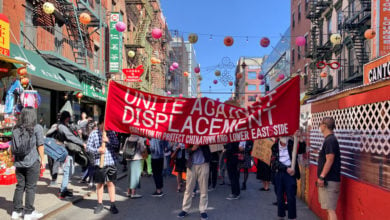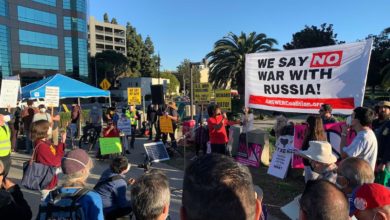This article is adapted from a talk given at the April 1 Socialism Conference hosted by the Party for Socialism and Liberation in Washington, D.C.
I would like to begin with a quote from Eugene Debs, a militant working-class leader of the left wing of the U.S. Socialist Party. In 1918, at the age of 63, Debs was sentenced to 10 years in prison because of his militant opposition to World War I.
He said, “I am not opposed to all war, nor am I opposed to fighting under all circumstances, and any declaration to the contrary would disqualify me as a revolutionist. When I say I am opposed to war, I mean ruling class war, for the ruling class is the only class that makes war.”
This last statement is critical. The ruling class in the United States—now and in Debs’ time—is the most powerful capitalist class on earth. Capitalism, an economic system based on private profit for a tiny owning class and the exploitation of millions of wage earners, is constantly propelled toward expansion. That expansion depends on war.
For that reason, any U.S. war is painted in rosy colors of “liberation” or “democracy.” In reality, it is only fought for conquest of natural resources, cheap labor, new markets or the maintenance of its global empire.

How else could one explain the Department of Defense’s over $500 billion budget in 2007, or why it employs 700,000 civilians and over 2 million military personnel? That budget is more than three times the gross domestic product of Venezuela.
Ever since 1775, the United States has permanently been at war—first in the genocidal campaigns against the Native Americans, then in a series of expansionist wars against Mexico and Spain, then in a series of inter-imperialist wars to win global hegemony, then in a series of wars to maintain that hegemony against revolutionary and nationalist liberation movements.
In the wake of each war, U.S. capitalism has expanded its economic domination and its military reach.
For example, Puerto Rico was invaded by U.S. troops in 1898 as part of its plunder in the Spanish-American War. Puerto Rico went from being a colony of Spain to a colony of the United States—a status that remains to this day, under the title of “Commonwealth.”
The Puerto Rican economy is completely dominated by U.S. corporations. While these corporations enjoy generous financial incentives to extract profits from the island, 60 percent of Puerto Ricans live in poverty.
In addition, there are some 25 U.S. military installations in Puerto Rico. Puerto Rico remains a key military staging point for U.S. military operations throughout Latin America.
The example of U.S. colonialism in Puerto Rico has been repeated in essence throughout Africa, Latin America, Asia and now the Middle East—anywhere the United States has staged wars or military interventions. The pattern is the same: set up political regimes that will guarantee U.S. economic interests, then set up bases to enforce those regimes and project U.S military power across the globe.
For that reason, the Pentagon maintains a network of 750 bases in 130 countries.
The features of imperialism
I have mentioned imperialism. What is imperialism really? Some people use the word to describe specific policies of a government—invading another country or setting up dependent regimes. By this definition, anti-war activists might hope to change the U.S. government’s policies of over 200 years to a more peaceful form of capitalism.
Socialists take a different view. Russian revolutionary leader V.I. Lenin analyzed the root causes of World War I in his 1916 pamphlet titled, “Imperialism, The Highest Stage of Capitalism.”
He found that major capitalist countries like the United States, Germany, Japan, Britain and France had some distinct features. The days of “free-market” capitalism, when one company competed against many others, were over. The big-money companies in these countries have merged into monopolies and global corporations. These corporate monopolies are coordinated by the world’s biggest banks, which increasingly organize their profit-driven economic activities on a world scale. Lenin also wrote that a defining feature of imperialism is the “complete division of the world into territorial spheres.”
Wars, based on this analysis, were not misguided policies. They reflected the fierce competition of the imperialist powers for the division and re-division of the world’s markets and resources that is built into this new phase of capitalism.
In other words, the policies of war and conquest flow naturally from the economic system of modern capitalism.
Cecil Rhodes, founder of the huge De Beers Mining Company, once said, “All these stars … these vast worlds that remain out of reach. If I could, I would annex other planets.” The comment was a reflection of the British imperialists, who then dominated the world economy, and their goal of maintaining their position against fierce competition.
Class war
Today, we understand that the U.S. occupation of Iraq is not some kind of mistaken policy by an ultra-right administration. It is a guiding principle of the ruling class—not just for profits, but also to maintain its dominant position relative to other imperialist powers. Control of the Middle East’s vast oil resources is a central goal of the U.S. ruling class including the Republican and Democratic Party leaderships.
Since the 2003 invasion of Iraq, all the lies used to justify the war have been exposed as just that—lies. There have been no weapons of mass destruction, no Iraqi woman is more liberated, and there certainly is no real democratic Iraqi government that can carry out any decision that the U.S government opposes.
The truth is that the war in Iraq is a class war—one waged by the U.S. imperialist ruling class against workers of all countries, including Iraqi workers and U.S. workers alike. It is a war in which military recruiters are strategically posted in public high schools in the United States trying to enlist poor and working class young people to fight poor and working class people in Iraq. It is a class war, where trillions of dollars—money that comes from our class in the form of taxes—are paying for the attempted genocide of the Iraqi people.
The only way for us to turn this situation around is to tell the truth about the war and to make it absolutely clear that not only is the invasion of Iraq a great crime against the Arab people, but also a great crime against us. It is a crime against the close to 50 million people in the United States without health care, the close to 40 million living in poverty and the 3.5 million that experience homelessness each year.
We must help everyone understand that the war in Iraq is part of a generalized class war against working people everywhere, including right here in the United States.
It is our responsibility to fight imperialism here in the very belly of the beast. We owe it to every life taken, every single drop of blood shed for the benefit of the ruling class.
Our best way to turn it around is to make the class war a two-sided one—where our class fights to unseat the ruling class from power and to get rid of the profit-driven system that is the root of all wars. That was the war that Eugene Debs was ready to fight.
The U.S. occupation of Iraq is part of the inherent drive to maintain U.S. control of profits and resources in the Middle East.
Photo: Patrick Baz/AFP/Getty Images






